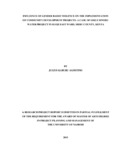| dc.description.abstract | Gender Based Violence occurs across all socio-economic and cultural backgrounds, and
in many societies, including Kenya. Women are socialized to accept, tolerate, and even
rationalize Gender Based Violence and to remain silent about such experiences. Although
studies have found that men too are victims of Gender Based Violence, however, women
are more affected in terms of their health and also psychologically. Therefore, the
purpose of this study was to assess the influence of Gender Based Violence on the
implementation of Community Development Projects. The objectives of the study were
to establish the influence of physical, sexual and socio-economic violence on the
implementation of Community Development Projects: A case of Gikui Mweru Water
Project. Through stratified random sampling the researcher obtained a sample size of 250
men and 50 women members of Gikui Mweru Water Project for the study.
Questionnaires and interview schedule were used to collect data. The Validity and
reliability of the instruments was assessed using test-retest method. Quantitative data was
analyzed using the SPSS and tabulated into frequency tables and percentages. Qualitative
data was analyzed by organizing information according to relevant themes drawn from
the research questions and objectives. The study established that most women and few
men had ever been physically abused by their spouses and the greatest form of physical
abuse experienced was slapping. The study also established that most women of the
project had ever sustained injuries because of the battering and that the injuries
experienced were moderate. The study also established that family breakup resulting
from physical violence divert members‟ attention from the project; family resources used
to pay hospital bills and conflicts management costs and that men and women members‟
participation level in the project‟s implementation activities is lowered. The study
revealed that experiences of rape by women influenced the implementation of Gikui
Mweru Water Project. Further, the study established that effects of GBV such as
inconsistence in remitting the monthly fees payable to the project, job loss as a result of
absenteeism leading to inability to pay the project‟s fees and conflicts with other
members of the project leading to disagreements delays the implementation of Gikui
Mweru Water Project. The study found out that sexual harassment influences the
implementation of the project through withdrawing membership, loss of job or promotion
hence drop in level of participation, absenteeism and resigning from project‟s activities.
The study found out that socio-economic violence experienced by some women members
such as denial of property rights and employment opportunities, and prevention from
advancing career, prevented them from implementation the Gikui Mweru Water project.
Overall, sexual violence had the greatest effect followed by physical violence while level
of socio-economic violence had the least effect on the implementation of Gikui Mweru
Water Project. This study therefore recommends that public education and awareness be
stepped up by the appropriate government agencies, civil societies, churches, mosques
and other NGOs. This will help to create gender awareness and sensitivity by exposing
gender stereotypes that encourage Gender Based Violence. | en_US |

